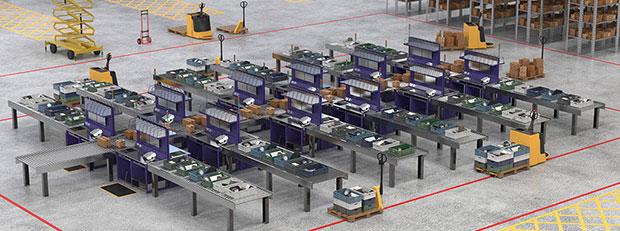Southgate, one of Europe’s leading suppliers, looks at the use of technology…
 Utilising data to enhance packaging performance
Utilising data to enhance packaging performance
For many of Southgate’s customers, data is now increasingly becoming a key factor when making packaging decisions. Used strategically, it can transform performance and help businesses stay successful and competitive. Sophisticated data analysis can provide insights and enhance performance.
The first and arguably the most important data to review is annual usage. Looking at hard figures surrounding the physical amount of packaging used, particularly with consumables. Whether this is kilos or metreage there has certainly been more attention to detail as the industry gets smarter on sustainability and waste.
Southgate has supported many customers looking at their packaging use, for example a high street retailer wanted to review their use of plastic wrap. After analysing their annual consumption, Southgate suggested a 300 per cent pre-stretch pallet wrapper, increasing one metre of film to four metres, giving the customer a significant annual saving.
Pack cost always remains one of the most essential pieces of data, though the new preferred method amongst the savvier customer is time and motion. This is particularly beneficial when analysing tape usage, usually when a comparison is being made between plastic and paper tape.
Southgate has also, for example, collated the data on usage for a furniture retailer, in metres of plastic tape and price per roll, adding in the time taken for a packing operator to seal the carton. The firm was advised to switch to water activated tape, which reduced the time per carton from 34 to 27 seconds and the average length of tape per carton from 5.1 to 1.5 metres, resulting in an annual saving of 17 per cent on packaging tape.
E-retailers often look at analysing the whole packaging process. Paper tape may be more expensive per metre than plastic, but e-commerce retailers have discovered that due to the strength and security benefits of paper tape, they can cut meterage and increase productivity.
Shift to automated packing processes
Processes are increasingly becoming automated with in line machinery, automated products offers multiple benefits from improved quality control to increased speed and enhanced ergonomics.
There are a number of automated products on the market. For example, packing stations equipped with tape and void fill and packaging dispensers, integrated with conveyors, automatic strapping machines and case tapers.
These innovations can make an average packing operation faster, saving time and money. Ensuring ‘everything to hand’ enables a packing operator to remain in one place while performing all tasks.
Playing a huge part in improving efficiencies, tape dispensers give the operator the benefit of taping boxes with pre-defined lengths of tape, increasing speed of completion and cutting wastage, whilst case tapers improve packaging optimisation with the machine controlling the consumable, applying the exact amount of tape required based on the specific carton size. This in turn has given e-commerce retailers specific data on usage and dramatically reduced wastage, while improving the re-ordering process.
In addition, pre-stretch pallet wrappers are a favourite with some e-commerce retailers as the machine is more accurate in its usage, out-performing manual wrapping.
E-commerce retailers sustainability drive
In the shift to be more sustainable the void fill market continues to develop as brands shift from traditional loose fill to air pillow. With circa 90 per cent of the latter simply being air there is a huge environmental benefit when it comes to reducing plastic waste. Couple this with the advent of biodegradable plastic and paper-based material, air pillows improve sustainability and can be recycled or composted unlike the traditional loose fill alternative.




Comments are closed.